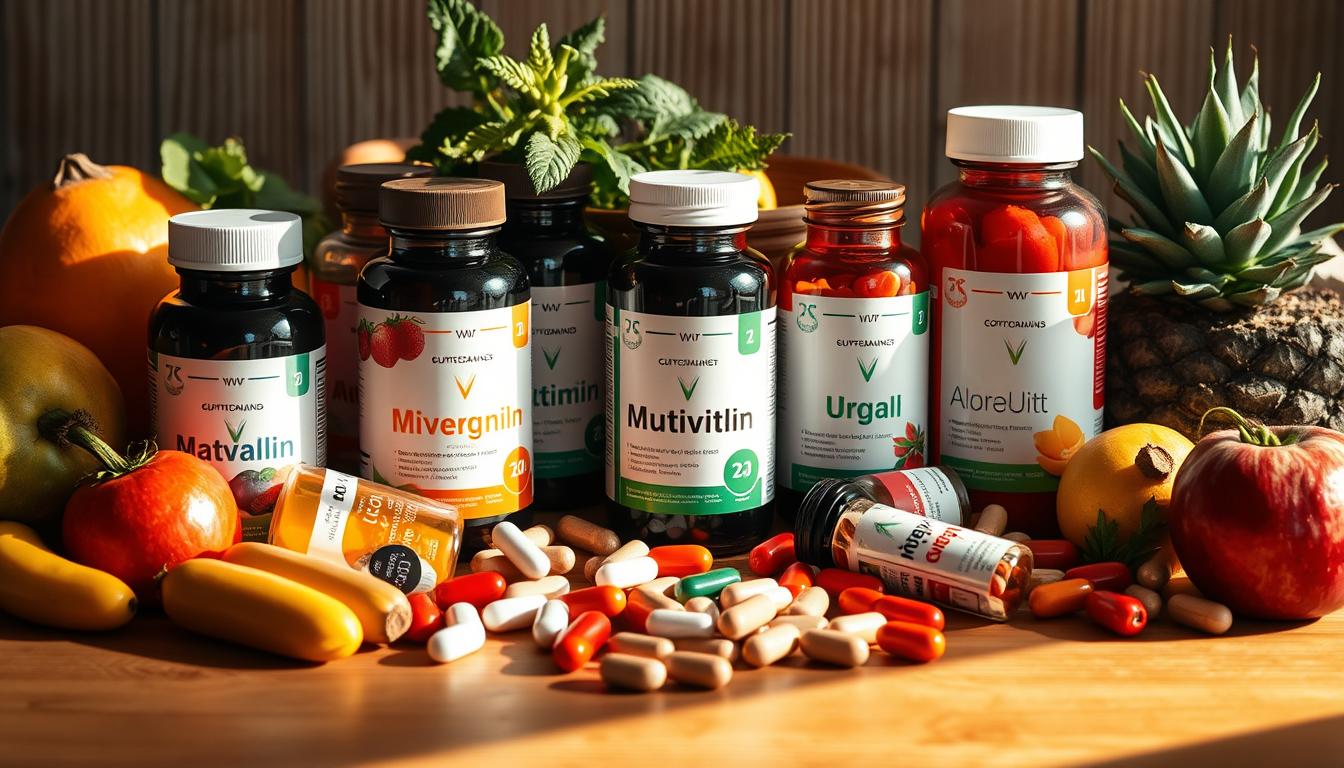Multi Vitamin Supplements: DO You Really Need Them ?
Every morning, millions of Americans take dietary supplements to fill nutritional gaps. Multi vitamin supplements are a key part of health routines in the U.S. About one-third of adults use them daily.
Starting your health journey with a multivitamin could be the first step. These supplements help ensure you get all the nutrients you need. They are popular among busy professionals and health enthusiasts alike.
The demand for dietary supplements is rising fast. In 2020, U.S. sales hit $8.0 billion. Women are more likely to use them, with 34% taking multivitamins regularly. This is compared to 28.3% of men.
Table of Contents
Key Takeaways
- One-third of U.S. adults take multivitamin supplements regularly
- Dietary supplements support nutritional balance
- Women are more likely to use multivitamin supplements
- Supplement sales reached $8.0 billion in 2020
- Multivitamins can help fill nutritional gaps in your diet
Understanding Multivitamin Supplements: A Comprehensive Overview
Exploring the world of daily vitamins can be tricky. With nearly 31% of Americans using health supplements, it’s key to know about vitamin capsules. This knowledge helps make better health choices.
Today’s health supplements come in many types to meet your nutritional needs. The global dietary supplement market, worth $177.5 billion in 2023, offers various formulas. These are designed to meet different health needs.
Types of Multivitamin Formulations
Multivitamin supplements mainly fall into three types:
- Basic Formulations: These supplements cover all essential nutrients.
- High-Potency Supplements: They have more concentrated vitamins and minerals.
- Specialized Supplements: These are made for specific health issues.
Key Components in Modern Supplements
Good health supplements include important nutrients to fill dietary gaps. With 45% of U.S. adults eating poorly, these supplements are vital.
Nearly one in three people in the U.S. are at risk of nutrient deficiency. This makes choosing the right supplements crucial.
Different Forms of Supplementation
Vitamin capsules are available in many forms to fit everyone’s needs:
- Tablets: These are compressed nutrient forms.
- Capsules: They have gelatin shells for easy digestion.
- Liquid supplements: They are absorbed quickly.
- Gummies: These are tasty alternatives for those who don’t like traditional forms.
Knowing these options helps pick the right daily vitamins. They should fit your health goals and lifestyle.
The Rising Popularity of Multi Vitamin Use in America
Multivitamin supplements are now a key part of health routines for many Americans. One in three US adults takes them to boost health and prevent diseases.
The multivitamin industry is booming, making over $56 billion a year worldwide. Experts predict it will hit $115.5 billion by 2034, growing 7.5% each year.
- 1 in 3 US adults consume multivitamins regularly
- Median age of supplement users: 61.5 years
- Annual global multivitamin industry revenue: $56 billion
Despite their popularity, research shows mixed results on multivitamins. A big study followed nearly 400,000 adults for 20 years. It found some interesting facts:
- Daily multivitamin use was linked to a 4% higher risk of death
- No proof they lower heart disease or cancer risk
- Nearly 165,000 deaths happened during the study
Not everyone gets the same benefits from multivitamins. Pregnant women get folate to prevent birth defects. Older adults might see better memory and slower brain decline.
It’s important to understand multivitamins well. They’re not a magic fix for health. But they can help those with special dietary needs or health issues.
Essential Nutrients: What Your Body Needs Daily
Knowing about nutritional balance is key for good health. Your body needs a mix of nutrients to work right. Dietary supplements help fill in any gaps.
- Macronutrients: Proteins, carbohydrates, and fats needed in large quantities
- Micronutrients: Vitamins and minerals required in smaller amounts
Water-Soluble Vitamins: Your Daily Defenders
Water-soluble vitamins like vitamin C and B complex are vital. Your body can’t store these, so you need them every day.
- Vitamin C supports immune system health
- B vitamins help convert food into energy
- Recommended daily intake varies by specific vitamin
Fat-Soluble Vitamin Essentials
Fat-soluble vitamins (A, D, E, K) are stored in body fat. They are important for health. They help with vision, bone health, and protecting cells.
Mineral Requirements for Optimal Functioning
Minerals are key for body functions. Important minerals include:
- Calcium: Supports bone health
- Iron: Essential for oxygen transportation
- Zinc: Boosts immune function
Even with a balanced diet, supplements can help. They support your body’s daily needs.
Benefits and Limitations of Multivitamin Supplementation
About one in three US adults take health supplements like multivitamins to boost their wellness. These supplements promise health benefits, but their true impact is complex.
One benefit of multivitamins is filling nutritional gaps in your diet. Studies show they help people get essential nutrients when they don’t get enough from food.
- Supports nutrient intake for individuals with dietary restrictions
- Provides balanced vitamin and mineral supplementation
- Potential support for overall metabolic function
Do multivitamins really work as a health fix? The science is mixed. A big study with nearly 400,000 people over 20 years found some interesting facts:
| Multivitamin Usage | Mortality Risk | Key Observations |
|---|---|---|
| Daily Users | 4% Higher Risk | No significant mortality benefit |
| Non-Daily Users | Baseline Risk | Moderate supplementation patterns |
While multivitamins can help with nutrition, they’re not a quick fix. The US Preventive Services Task Force says routine multivitamin use has little health benefit.
Nutrition experts recommend prioritizing a balanced diet over relying solely on supplements.
People spend about $8 billion a year on multivitamins, showing their popularity. But, always talk to a healthcare professional to find the right supplements for you.
Who Should Take Multivitamin Supplements?
Dietary supplements are key for many people. They help fill nutrient gaps. Knowing who needs them most can boost your health.
Age-Specific Nutritional Needs
Our nutritional needs change as we age. From kids to seniors, our body’s needs change a lot.
- Children: Support growth and development
- Teenagers: Address rapid physical changes
- Adults: Maintain overall health and prevent deficiencies
- Seniors: Combat age-related nutrient absorption challenges
Special Population Groups
Some groups need more nutrients. This makes supplements very important for them.
| Population Group | Key Nutritional Considerations |
|---|---|
| Pregnant Women | Require 400 mcg folic acid to prevent birth defects |
| Vegans/Vegetarians | Need supplemental B12 not found in plant foods |
| Individuals with Restricted Diets | May need targeted nutrient supplementation |
Health Conditions Requiring Supplementation
Some health issues raise the need for certain nutrients. Digestive disorders, chronic illnesses, and specific genetic factors can make supplements necessary.
- Gastrointestinal disorders affecting nutrient absorption
- Chronic conditions like diabetes
- Autoimmune diseases
- Nutrient malabsorption syndromes
Nearly 50% of Americans take daily multivitamins to support their nutritional needs.
Always talk to a healthcare professional before starting supplements. They can make sure they’re right for you.
Safety Considerations and Potential Risks

Exploring health supplements means knowing the risks of vitamin capsules. The dietary supplement market is huge, but not all multivitamins are the same. So, do multivitamins really work as promised? It’s a question that needs careful thought.
There are several safety points to keep in mind:
- Medication Interactions: Some supplements, like St. John’s wort, can change how your body handles medicines
- Potential Nutrient Overdose: Taking too much of certain vitamins can cause health problems
- Regulatory Limitations: The FDA doesn’t check dietary supplements for safety or effectiveness before they hit the market
Research sheds light on supplement safety. A big study looked at data from 390,124 U.S. adults. It found no link between regular multivitamin use and lower death rates. This shows how vital it is to know the limits of supplements.
| Age Group | Potential Supplement Risks | Recommended Caution |
|---|---|---|
| Adults Over 50 | Decreased B12 absorption | Consult healthcare provider |
| Pregnant Women | Potential neural tube defect prevention | Folic acid supplementation |
| Elderly | Increased osteoporosis risk | Vitamin D supplementation |
It’s important to think about your health, any medication you’re taking, and what nutrients you need. Always talk to a doctor before starting any new supplements. This ensures they’re safe and work well for you.
Impact on Overall Health and Wellness
Multivitamin supplements are key for your body’s health and wellness. They are not a magic fix but can help support your immune system. They also fill nutritional gaps that affect your daily life.
Your body’s health depends on many things, including what you eat. Studies show that multivitamins can help a lot in different health areas.
Physical Health Benefits
Multivitamins protect your body from harmful free radicals with antioxidants. They help in many ways:
- Boost your immune system
- Fix damaged cells
- Help your body work right
Mental Health Effects
Supplements can also boost your mental health. Research shows that some vitamins can:
- Lessen stress
- Improve your thinking
- Help keep your mood steady
Energy and Vitality
Multivitamins have energy boosters that fight fatigue. Nature Made® Multivitamin Tablets give you 23 important nutrients for more energy.
About 1 in 3 Americans take multivitamins every month. They spend around $8 billion a year on them. While they’re not a fix-all, they can be a good part of a healthy diet and lifestyle.
Choosing the Right Multivitamin Product

Finding the perfect multi vitamin can be tough with so many options out there. It’s important to know what your body needs. This helps you pick the right daily vitamins.
When looking at multivitamin supplements, keep these points in mind:
- Your age and gender-specific nutritional requirements
- Specific health conditions or dietary restrictions
- Quality certifications from reputable organizations
- Ingredient transparency and bioavailability
Choose supplements with third-party testing and USP (U.S. Pharmacopeial Convention) verification. These signs show the product is safe and of good quality. Not all vitamin capsules are created equal.
Quality matters more than quantity when selecting your daily vitamins.
Here are some signs of a top-notch multivitamin:
| Quality Indicator | What to Look For |
|---|---|
| Nutrient Forms | Methylated B vitamins, chelated minerals |
| Absorption | Bioavailable nutrient forms |
| Certifications | USP, NSF, GMP verified |
Since 30% of Americans don’t get enough nutrients, picking the right multi vitamin is key. It can greatly improve your health and well-being.
Natural Sources vs. Supplementation
Whole foods are the best way to get essential nutrients. Yet, over 90 percent of Americans don’t get enough vitamin D and E from food. This shows how hard it is to get all the nutrients we need just from eating.
Health supplements can help fill in the gaps, but they can’t replace the nutrients in real food. Foods like fruits, veggies, lean proteins, whole grains, and nuts have complex nutrients that supplements can’t match. The average diet often lacks vitamin C but has too much saturated fat. This makes supplements a good choice for some people.
Some groups might need special supplements, like people over 70, pregnant women, and those with malabsorption issues. Your body’s needs are different, and talking to a healthcare professional can help figure out if you need supplements. Remember, supplements are meant to support your health, not replace eating real food.
It’s important to know what your body needs. Some people might need extra vitamins, especially if they have chronic conditions or special diets. By eating whole foods and choosing supplements wisely, you can improve your health and nutrition.








6 Comments
Comments are closed.